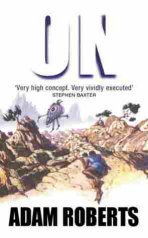
On
Adam Roberts
388 pages
published in 2001
On is Adam Roberts' second novel, after 2000's Salt. I had read Salt and liked it enough to try more of Roberts' novels. So when I spotted On in the Amsterdam library, I took it out. I'm glad I could do that and didn't have to pay for it, as I don't think it would've been worth it. This is not a very good novel. It has major plot problems, suffers from a boring protagonist and somewhat detached writing.
The concept Roberts plays with here certainly is interesting enough. The world of On is a gigantic mountain, which the people living on its ledges and in its caves and crevices call the Worldwall. This is not a new concept; Robert Silverberg used a similar idea in his Kingdoms of the Wall, but it is an underexplored concept. Imagine what a Jack Vance would do with a world like this.
Unfortunately, Roberts does not do very much with it. There are times in the novel where he allows the wonder of the worldwall to shine through, but on the whole it only serves as a backdrop for the tedious pedestrian adventures of the protagonist, a boy called Tighe. As was the case with Salt's protagonists, I just didn't like Tighe very much.
Tighe is a teenage boy, the son of the prince of a little village on a ledge high on the Worldwall, whose mother is partially insane and violent. He is a bit of a dreamer and not very happy with his life. In short, he could be the hero of a hundred different sf or fantasy novels. One day he falls from the ledge his village is on and his adventures begins. However, this only happens about a third of the way in, after I got somewhat bored with Tighe...
After Tighe miraculously survives his fall, the book picks up. Tighe becomes a soldier and later even a flyer pilot in the army of the War Pope. After that army's destruction, Tighe escapes captivity and meets a Wizard who explains the story behind the Worldwall and why Tighe is such a special boy.
Roughly then, the plot is divided in three: Tighe's adventures at home, his time in the War Pope's army and finally his conflict with the wizard. Each succesive part opens up Tighe's world in a classic sf plot pattern. However, the plot as a whole doesn't gel. Again, as with Salt, the story i sn't resolved as much as ends and the three parts barely fit together. This is not an insurmountable problem, as long as the protagonist is strong and interesting enough to keep the various story parts connected. This is not the case with Tighe though, who stays slightly repulsive and boring.
In the first part of the book we got to know Tighe and his village, in the second part we followed him out into the wider world and in the final part we learn who Tighe is, but more importantly we learn the origins of the Worldwall. And unfortunately, these origins will likely lead to bookthrowing, as they revolve around some dodgy physics: experimental science as filtered through an english professor.
In all, this was a worse novel than Salt and I would recommend you to skip it. The central concept was interesting enough, if only it had been worked out in better detail, but the plot meanders and the hero is unsympathetic.
